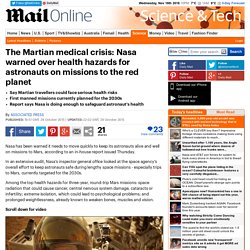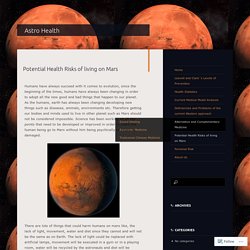

Mars Settlement Pioneers Will Face Huge Psychological Challenges - Universe Today. Imagine you are on the crew of a Mars mission and you fall out with a fellow crew member.

You can’t walk away from them. Imagine you are on the surface of Mars and you suffer terrible home sickness. You can’t simply fly back to your family. Imagine there is a medical emergency in your team en-route to the Red Planet. You can’t call emergency services, you’re on your own. Plans are afoot for a long 520-day mock Mars mission this year to study the effects isolation has on a group of 12 volunteers. A lot of research has been done on astronauts ever since Yuri Gagarin was launched into orbit alone in 1961. It seems natural that Mars astronauts will want gifts, luxuries and other “reminders from home”, as is possible on the International Space Station, but they will be totally isolated with no ferrying of items when they leave the safety of Earth. Effect of spaceflight on the human body - Wikipedia.
Astronaut Marsha Ivins demonstrates the effects of zero-G on her hair in space Venturing into the environment of space can have negative effects on the human body.[1] Significant adverse effects of long-term weightlessness include muscle atrophy and deterioration of the skeleton (spaceflight osteopenia).[2] Other significant effects include a slowing of cardiovascular system functions, decreased production of red blood cells, balance disorders, eyesight disorders and changes in the immune system.[3] Additional symptoms include fluid redistribution (causing the "moon-face" appearance typical in pictures of astronauts experiencing weightlessness),[4][5] loss of body mass, nasal congestion, sleep disturbance, and excess flatulence.

The engineering problems associated with leaving Earth and developing space propulsion systems have been examined for over a century, and millions of hours of research have been spent on them. Cognitive Effects[edit] Research[edit] Ascent and reentry[edit] ... Mars - How much gravity is actually needed to avoid serious health consequences? - Space Exploration Stack Exchange.
Current community your communities Sign up or log in to customize your list. more stack exchange communities company blog Stack Exchange Inbox Reputation and Badges sign up log in tour help Space Exploration beta Ask Question Space Exploration Stack Exchange is a question and answer site for spacecraft operators, scientists, engineers, and enthusiasts.

Here's how it works: Anybody can ask a question Anybody can answer The best answers are voted up and rise to the top. Health Risks Pose Hurdle for Travel to Mars. By Betsy QuernaNational Geographic Today May 18, 2001 Humans may soon be on their way to Mars.

But human safety is paramount in space missions.Depending on its orbit, Mars can be 500 times farther from Earth than the moon. Traveling such a long distance poses health problems never faced before. Being weightless for the entire mission would cause degeneration of muscles, bones, and the heart. Another issue that must be addressed is the huge amount of radiation exposure that occurs outside the atmosphere. Chemically propelled engines, which are currently used for space flights, would not be able to carry enough fuel for the spacecraft to turn around and return to Earth if a problem such as trauma or serious illness occurred on board. NASA is now looking into ways to deal with some of the physical risks. Astronauts would be confined in the spacecraft for most of the mission.
Scientists have discovered evidence that water may have existed on Mars, and may still be present under the surface. NASA needs better handle on health hazards for Mars. Nasa has been warned it needs to move quickly to keep its astronauts alive and well on missions to Mars, according to an in-house report issued Thursday.

In an extensive audit, Nasa's inspector general office looked at the space agency's overall effort to keep astronauts safe during lengthy space missions - especially trips to Mars, currently targeted for the 2030s. Among the top health hazards for three-year, round-trip Mars missions: space radiation that could cause cancer, central nervous system damage, cataracts or infertility; extreme isolation, which could lead to psychological problems; and prolonged weightlessness, already known to weaken bones, muscles and vision. Who Will Save Your Life on Mars? Potential Health Risks of living on Mars. Humans have always succeed with it comes to evolution, since the beginning of the times, humans have always been changing in order to adopt all the new good and bad things that happen to our planet.

As the humans, earth has always been changing developing new things such as diseases, animals, environments etc. Therefore getting our bodies and minds used to live in other planet such as Mars should not be considered impossible. Science has been working on all the points that need to be developed or improved in order to make the human being go to Mars without him being psychically or mentally damaged. There are lots of things that could harm humans on mars like, the lack of light, movement, water and diet since they cannot and will not be the same as on Earth. Mentally, astronauts would be harm with loneliness, psychological issues since they will be coexisting with only a certain number of people. Like this: Like Loading... William Gardiner - Medical Factors - 19th Annual International Mars Society Convention.